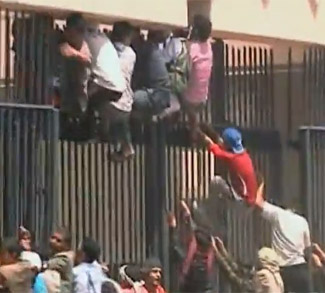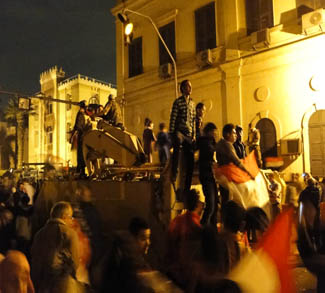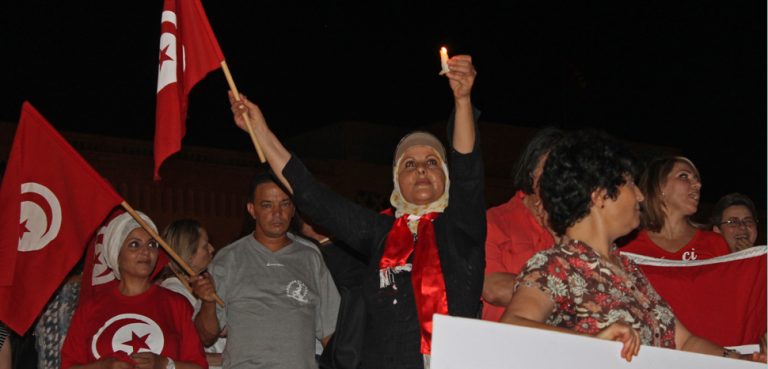The latest hotspot in the universally praised Arab Spring– that elusive phenomenon that continues to reconfigure the political countenance of the Middle East- has left a United States ambassador and three diplomatic staffers dead, marking the first time in 30 years that a chief U.S. envoy was murdered in a foreign mission. As of Friday, September 21st, American diplomatic facilities have shut down operations in Pakistan and Indonesia due to growing protests. Tunisian authorities have also banned public demonstrations, fearing an escalation following Friday sermons.
On September 20th, Matthew Olsen, Director of the National Counterterrorism Center, controversially but categorically stated that the deadly incident in Benghazi, Libya- the epicenter and seat of operations of the insurgency that won NATO backing in order to avoid the massacre promised by dictator Muammar Gaddafi- was a terrorist attack, indicating, as a matter of course, that the assault had been planned, and was not part of the protests in vogue against a film condemned by Muslims worldwide.
It seems most plausible that the “film crisis” provoked by “Innocence of Muslims” and its concomitant mass protests, has been tactically used as a smokescreen and a justificatory public relations mantle for terrorist operations, thereby harnessing the legitimating mechanism of “popular grievance”- a tactic that is historically all too common of terrorist organizations.
Yet again, we are in the midst of a dark side of intercultural communication, a phenomenon we can call a “civilizational media crisis”: a religio-political conflict played out in the worldwide forum of unlimited access to information and universal information-diffusion, an environment that exacerbates every salient political and cultural point of conflict between the Middle East and the West, thereby outlining in blood the fault-lines delineating the civilizational divide. The narrative in these “media crises” is usually the same, as we have seen recurrently, from Salman Rushdie to Pope Benedict’s Regensburg speech, to the Danish cartoons, and now this film and the subsequent cartoons printed in France: some brazen, and perhaps foolhardy Westerner creates a work that in some way is deemed “blasphemous” by Muslims worldwide; activists draw attention to it, and the media organizations in the Muslim world pick up on it and incessantly beat the drum of “Islam’s outraged masses once again suffering an obscene indignation”; politicians in Muslim countries, eager to amass political capital from the streets, request that the Western government in question does something that it clearly cannot do because of the constraints that liberal democracy places on the arbitrary use of power; because of the western government’s inability to punish the “sinner,” that country and the West as a whole is accused of psychological terrorism against Islam. It is a recurrent theme and a recurrent crisis—one that Western policymakers must learn to contain, if containing such a thing is even possible.
This particular “film crisis” is a near-perfect public relations disaster, as it includes all the ingredients present in the fictional conspiracy theories endlessly fermenting on the proverbial Arab Street- and these days politics and the fates of governments are decided on these streets. A self-described Israeli-American produces a film that characterizes the Muslim prophet in an obscenely satirical manner, bludgeoning every sacred scruple held in regard to the religion’s founder. The film is reportedly funded by Jewish donors and peddled by Terry Jones, the “Koran burning pastor” from Florida- the sensational conspiracy theories haven’t even begun to metastasize! To top it all off, a French magazine has published cartoons that touch on the very same chords that setoff the protests of the film: the portrayal of the Muslim Prophet, a taboo tantamount to an incitement to idolatry on the part of the “decadent West.” Because it is the “film crisis” that is arousing so much attention, we will focus on it in this analysis, and in the manner that such a crisis can be used, politically, to maximize the radicals’ long arm of influence.
When we construct our historical or political narratives we are telling a story inked with a particular “color” of ideology, presuppositions and assumptions. People project their well-intentioned desires universally, and rarely do they acknowledge that they may not be universally desired—at least in the short-term. As the “Arab Spring” continues to unfold, the narrative in the West was that a new zeitgeist was being ushered in, and Libya and Egypt were the ultimate testing grounds, the breakthroughs, the historical junctures, the watershed moments marking the progress of a region, the Arab World finally joining the steady march of history towards a universal concert of democratic nations. In the case of Libya, the NATO intervention probably did rescue a city from a massacre, and the loose confederation of tribal, military, and jihadist allies against Gaddafi certainly yearned for self-determination. But self-determination is not democracy, and democracy is not always Liberal Democracy ala France, UK, or the U.S. The current crisis is highlighting how fundamental Liberal tenets are, in many ways, apparently incompatible with the type of democracy that the Arab Spring is producing. But because our interests in the region are not diminished by the rise of a problematic type of democracy, the onus is on us to understand it, and also to understand the diffusion of politically expedient media communications that imperil American and European interests in the area.
The Politics of Outrage and PR: The Centrality of Egypt
In these “media crises” we recurrently see that the diffusion of the “blasphemous” material is not “organically” spread for the world’s Islamic condemnation, for it never actually appears on a median large enough to be noticed by everyone in a single country, let alone the world. Rather, it is methodically and systematically spread by politically astute actors bent on maximizing their influence through the use of worldwide “Muslim outrage.” Essentially, public opinion is molded. In this “film crisis” we are led to Sheikh Khalid Abdullah, an Egyptian “tele-jihadist” with a huge audience, who found the 13-minute film online and featured parts of it on his show. The film had been out since June 23rd, yet protests began only on September 11th. Abdullah regularly uses incendiary language against Jews, Christians, and Egyptian progressives, and this time he urged his audience to protest outside the U.S. embassy in Cairo. His show was the first to feature the film in the Arab world, but Al-Jazeera followed suit, giving the film worldwide notoriety. We are seeing the media acting as arbiters of the issues on the Arab Street, and thus by no means can these shows of “outrage” be considered spontaneous reactions by common people in the Middle East.
That the controversy was “channeled” to the Arab Street by Egypt is symptomatic of that country’s importance in the world of political Islamism. Once the seat of the great Fatimid Caliphate, in the 20th and 21st centuries Egypt has been ground zero for the epic fight waged between Arab nationalist secularism and supranational Islamic militancy, giving birth both to the Muslim Brotherhood in 1928 (President Morsi’s own party), and the secular, military-backed government that kept the peace between Israel and Egypt since Anwar Sadat and his successor, Hosni Mubarak. The progenitor of contemporary Islamism is Sayyid Qutb (1906-1966), an Egyptian who authored the foundational text of revolutionary political jihadism, “Signposts.” The book highlights a masterful ability to co-opt Islamic history and terminology, and radically recast it into a modern, easily transplantable ideology that synthesizes the most fundamentalist readings of Islamic jurisprudence into a political ideology. The central theory of Islamism is the following: the reversion to Jahiliya, the state of pre-Islamic “ignorance,” is now universal; there is no truly Islamic society anywhere, and consequently all states must be overthrown and replaced with Sharia Law. With Qutb began the hijacking of the “Arab Street” and the molding of Islamic public opinion. Now that the Muslim Brotherhood’s Mohammed Morsi is president, he will have to balance his party along a fine line, keeping his coalition moderate, whilst also consolidating his Islamist credentials. He did the latter when he called upon the U.S. president to prosecute the film’s producer- something that Morsi knows cannot be done under American law.
This film’s propagation has behind it all the indicators of political machination. It puts Morsi in a precarious situation of having to consolidate the radicals who supported him, thus perhaps pressuring him into actions that would alienate Egypt from the central place it holds in working towards Middle Eastern peace. Osama bin Laden’s successor, Ayman Al-Zawahiri, has long held that jihad in Egypt is a paramount concern for Al-Qaeda, and if he can discredit the pragmatic Morsi by labeling him a Western sympathizer, Morsi’s powerbase may be put to the test. If, on the other hand, he inflames himself to an unacceptable rhetorical pitch, then his powerbase will be likewise threatened by the military. Ultimately, He will be hoping that the fuss dies down, and dies down fast.
We sometimes forget that Al-Qaeda and global jihadism is primarily a political movement internally justified by a particular interpretation of a religious creed. The rhetorical claim of wanting to found an Islamic caliphate—a worldwide state ala Taliban circa 1994—is a religio-political goal. That they seek to implement this idea one state at a time implies a desire to universally discredit democracy in the Muslim world. If radicals are disenchanted by a pragmatic Muslim Brotherhood, then Morsi also becomes fair game.
Murders in Benghazi: Smokescreen of Terror
We have concentrated this analysis on Egypt primarily because we were focusing on the phenomenon of media crises and how they serve the political interests of Islamists. The murder of Ambassador Chris Stevens and three other diplomatic staffers in Libya shows how dreadfully difficult it is to prognosticate the course of events following a universally praised military intervention that yielded a new political chaos. In Libya it seems more likely that the murder of the ambassador is a retaliatory attack for the death of Al-Qaeda’s second in command, Abu Yahya Al-Libi (“the Libyan”), who was killed in a drone strike in Pakistan in June. The protests outside of the U.S. embassy in Benghazi were perfectly situated to help stage the attack, adding a fog to the operation that has now been called a terrorist attack. Aside from the terrorists that killed the ambassador, it may utterly shock Westerners as to how easily the Libyans were inflamed against their deliverers—especially in Benghazi, as it would have been the site of a tremendous massacre had U.S. and French planes not decimated Gaddafi’s militias. Government security forces in Benghazi were absent from their duty to protect a foreign embassy in their country, and it is quite possible that they simply deemed it too politically dangerous- after all, the protests had been shown to be in vogue in Egypt, and had spread elsewhere, and, of course, Al-Jazeera was pounding the drum of outrage.
Less speculatively, it is evident that once Gaddafi was removed, militant factions, suppressed under his rule, have been left to roam the cities and deserts, virtually unchecked. As the elections resulted in a moderate victory, the decline of the jihadists was inevitable unless they staged a particularly devastating blow to an important target in the new, more moderate Libya: and in the world of international relations, no blow is bigger than the murder of a country’s ambassador. The Salafist group Ansar Al-Sharia, a militant organization with ideological ties to Al-Qaeda, has claimed that it did not act by itself in the attack, and it has repeated the jihadist mantra that the protests were spontaneous. As there are eyewitness accounts claiming they saw trucks bearing that group’s logo in the embassy attack, and given their pre-election statements that voting in Libya would be “sinful,” it is certain that U.S. counterterrorism measures must consider the group existentially threatening to a democratic Libya.
An Insoluble Problem?
At its core, this type of international crisis is eminently modern. The religion of Islam is not a strictly hierarchical religion, and as it today lacks any type of central authority, its most volatile politicized adherents are able to harness the universal media-diffusion available to mold Muslim public opinion for a particular political end. Two decades ago the Rushdie Affair’s deadly Fatwa caused a re-rupture of Iran’s diplomatic ties with the United Kingdom following the Iranian Revolution, probably orchestrated by hardliners that wanted to avoid a moderating rapprochement. Today, there is every reason to believe that radical jihadists want to alienate the Arab Spring’s reform movements from the West, and a sure way to do this is by radicalizing the masses, reducing the political space into an “Islam versus the West” propagandistic narrative, and in effect, hijacking the social movements. Containing such media crises is terribly difficult because the fires of frenzy are fueled by the region’s religious, media, and political elites. Ultimately, there is a conflict of principles when free speech is involved, as the West and Islamic civilization have, for centuries, taken diametrically different routes in this issue. In the 14th century the famed Italian poet Dante Alighieri, in his masterpiece the Divine Comedy, placed the reigning Pope Boniface VIII in Hell, and whilst the pope certainly didn’t like it, there was nothing he could do against the writer. The political virtue of free speech, however politically inconvenient, has an ancient pedigree in the West. But any cursory glance at the Middle East reveals it to be, in that regional context, a highly problematic and occasionally “blasphemous” construct. As media access is democratized, cultural and religious attitudes are not necessarily liberalized: a sure recipe for further problems of this sort.




